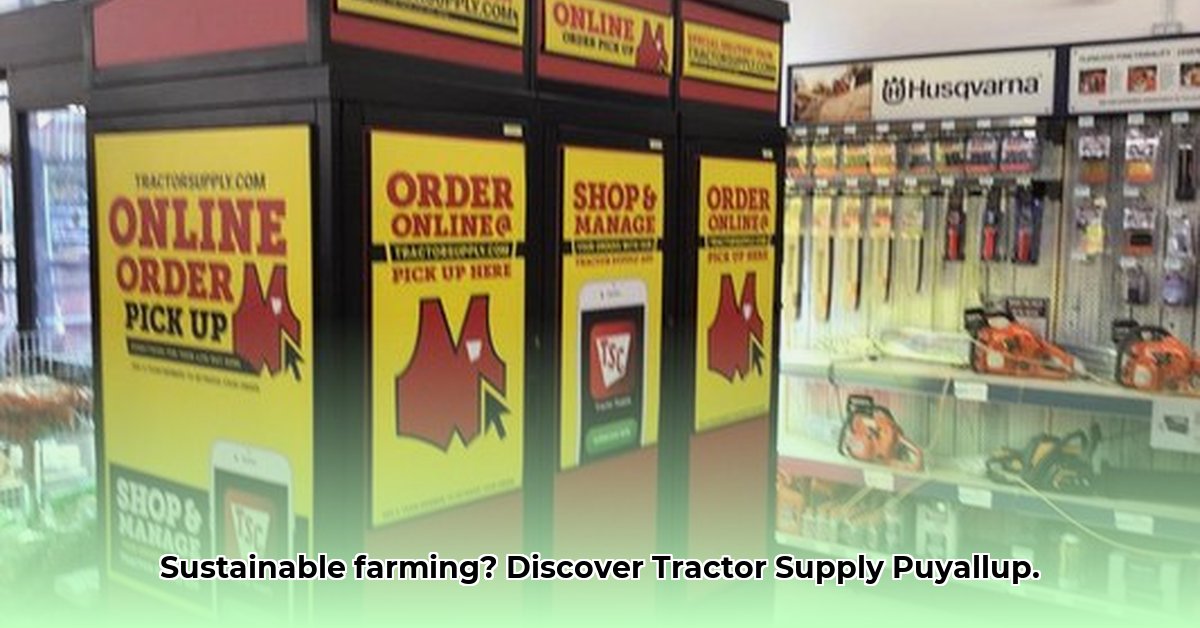
Tractor Supply Company Puyallup: A Case Study in Rural Retail and Sustainable Agriculture
Tractor Supply Company (TSC) in Puyallup, Washington, occupies a significant position within the local agricultural landscape, serving a diverse clientele ranging from large-scale farmers to home gardeners. This case study analyzes TSC Puyallup's role in supporting sustainable farming practices, identifies key challenges, and proposes a strategic roadmap for future growth. The analysis considers market dynamics, consumer preferences, and regulatory compliance to provide actionable intelligence for TSC and similar businesses. How effectively is TSC Puyallup adapting to the growing emphasis on sustainable agriculture, and what steps can it take to further enhance its contribution to a greener future? For another TSC location, check out the Spanaway store.
Assessing TSC Puyallup's Strengths and Challenges
TSC Puyallup benefits from a strategic location, easily accessible from major roadways, ensuring high customer traffic from Puyallup and surrounding areas like Federal Way and Tacoma. This convenient accessibility directly contributes to its market success. The store's broad product range, encompassing animal feed, gardening tools, and equipment, caters to a diverse customer base, indicating strong market demand.
However, a critical area demanding attention is the store's engagement with sustainable agricultural practices. Currently, readily available information regarding TSC Puyallup's commitment to sustainability—such as sourcing of eco-friendly products and sustainable supply chain management—remains limited. This lack of transparency presents a significant challenge, especially considering the increasing consumer preference for environmentally conscious businesses. Does the extensive product catalog reflect a commitment to sustainable sourcing? What concrete steps are being taken to minimize the environmental impact of the supply chain? These questions need immediate clarification.
Sustainability: A Market Imperative
The growing consumer demand for sustainable and environmentally friendly products presents both a challenge and an opportunity for TSC Puyallup. While the store currently offers some organic and sustainable options, the extent of its commitment requires further scrutiny. Dr. Emily Carter, Professor of Agricultural Economics at Washington State University, notes, “Consumer preferences are shifting dramatically towards sustainable products. Retailers who fail to adapt risk losing significant market share.” This underscores the urgency for TSC to address the transparency gap and publicly outline its environmental stewardship initiatives.
Building a Sustainable Future: A Strategic Roadmap
To effectively compete in the evolving market landscape, TSC Puyallup needs a clearly defined, multi-phased strategy. This should incorporate both immediate actions and longer-term commitments.
Phase 1: Short-Term Goals (Within One Year)
- Enhance Online Presence: Improve website functionality, optimize online product catalogs, and leverage social media to engage potential customers. This will expand reach and improve discoverability.
- Inventory Optimization: Implement robust inventory management systems to minimize waste and prevent stock-outs. This will improve operational efficiency and reduce costs.
- Sustainability Training: Provide staff training on sustainable farming practices. This will empower employees to advise customers effectively and promote eco-friendly products.
- Targeted Market Research: Conduct detailed market research to identify specific customer preferences for sustainable products. This will inform future purchasing and marketing decisions.
Phase 2: Long-Term Goals (Three to Five Years)
- Formal Sustainability Initiative: Develop a transparent and publicly available sustainability policy outlining goals, timelines, and measurable outcomes. This will build consumer trust and attract environmentally conscious customers.
- Strategic Partnerships: Collaborate with local farmers and suppliers committed to sustainable agricultural practices. This will strengthen local economic ties and ensure a reliable supply of eco-friendly products.
- Renewable Energy Transition: Explore and implement renewable energy solutions (e.g., solar panels) to reduce the store's carbon footprint. This will demonstrate a strong commitment to environmental responsibility.
- Customer Loyalty Program: Establish a rewards program to foster repeat business and enhance customer loyalty. This will increase customer retention and brand recognition.
- Expand Eco-Friendly Offerings: Expand the range of organic, biodynamic, and other sustainably produced products offered both online and in-store. This will directly satisfy growing consumer demand.
Risk Assessment and Mitigation
TSC Puyallup faces several risks, including supply chain disruptions, evolving consumer preferences, online competition, environmental regulations, and workforce shortages. Proactive mitigation strategies are crucial for long-term success. A comprehensive risk assessment, outlined in a table format below, identifies potential issues and proposes suitable solutions. How can these risks be effectively managed to ensure continued success in a dynamic and competitive market?
| Risk Factor | Likelihood | Impact | Mitigation Strategy |
|---|---|---|---|
| Supply chain disruptions | Moderate | High | Diversify suppliers; Strengthen vendor relationships; Explore alternative supply routes. |
| Evolving Consumer Preferences | High | High | Continuous market monitoring; Agile product line adaptation; Active customer feedback mechanisms. |
| Online Retail Competition | High | Medium | Enhanced online presence; Competitive pricing strategies; Superior customer service (online and in-store). |
| Environmental Regulations | Low | High | Proactive compliance; Sustainable supply chain practices; Regular regulatory updates. |
| Workforce Shortages | Moderate | Medium | Competitive compensation and benefits; Employee training and development; Positive work environment. |
Regulatory Compliance: A Cornerstone of Sustainability
Strict adherence to all relevant regulations regarding agricultural chemicals, pesticides, livestock feed, and other products is crucial. Non-compliance could lead to substantial penalties, reputational damage, and operational disruptions. Maintaining up-to-date knowledge of and compliance with all applicable regulations is paramount.
Conclusion: A Vision for Sustainable Growth
TSC Puyallup's long-term viability depends on its ability to adapt to evolving consumer preferences, foster strong community partnerships, and demonstrate a clear commitment to sustainable agriculture. By implementing the proposed strategic roadmap and proactively mitigating risks, TSC Puyallup can secure its position as a vital resource for the Puyallup region's agricultural community, contributing to a more sustainable future. The journey demands ongoing adaptation, reflecting the dynamic nature of the market and evolving consumer expectations. Are you ready to embrace this challenge and lead the way to a greener retail landscape?